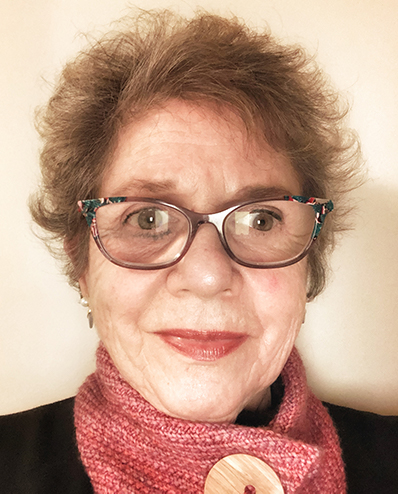Sharon Kassakian, 76, has called Portland home the past seven years. An East Coast native, Kassakian was preparing for retirement following a career as a college counselor in New Jersey, when the tragedy of 9/11 became the first of several life-changing events she would face. Kassakian, whose husband was president of an international firm in the World Trade Center, lost 69 members of his staff in the Twin Towers. He witnessed the devastation that morning while driving to his 92nd floor office in the World Trade Center, arriving just minutes after the collapse. Struggling to support her husband's grief for months afterwards, he subsequently passed away from pancreatic cancer.
A self-professed survivor, Kassakian eventually relocated to Portland to be near her children and grandchildren, with hopes of moving forward in the aftermath of her losses. The first few months in Portland brought additional challenges for Kassakian after eye surgery to repair a hole in her retina resulted in vision loss in her right eye. "After my surgery, I noticed my vision was weakening rapidly," recalls Kassakian. "I had no idea what was happening. I was reunited with my children and in a new part of the country, but couldn't see or experience any of it clearly, I felt more lost than ever." Kassakian was eventually diagnosed with macular degeneration.
Age-related macular degeneration (AMD) is the most common cause of severe loss of eyesight among people 50 and older, in its early stages, AMD may have no signs or symptoms, so people may not suspect they have it. AMD affects the central vision, and with it, the ability to see details. In advanced stages, people lose their ability to drive, to see faces, and to read print. Kassakian remembers the months of ups and downs following her diagnosis. "I would wake up every morning to check my vision using an eye chart." Not knowing what the future holds or where to turn was the most frightening part of my early experience with vision loss.” Since her diagnosis Kassakian has received treatment to maintain her remaining vision.
Throughout her profession as a career counselor, Kassakian became proficient at networking and using technology to research and identify resources, using these skills to locate and participate in numerous Portland-area support groups for those with vision loss, including a local hospital-based program where she was introduced to Hadley.
Kassakian found Hadley's tutorials on how to use Zoom for those with vision loss to be extremely helpful during the pandemic to stay engaged with family, friends, and other vital resources, spending hours participating in Hadley discussion groups on topics such as learning braille and workshops on accessing special low vision features on her cell phone. As she became more comfortable in her new surroundings Kassakian began accessing public transportation using tips from Hadley – while commending Portland for its highly accommodating public transportation system for the blind and visually impaired.
Hadley recently enlisted Kassakian as an advisor providing ongoing feedback about Hadley's user experience, taking part in prototype interviews for new workshops, and offering other valuable perspectives. For her prolific commitment to learning, Kassakian has been named a recipient of Hadley’s HEROES Award, given to those who help further Hadley's mission to create personalized learning opportunities that empower those with vision loss or blindness to thrive at home, at work, and in their communities.
Speaking on receiving the honor from Hadley Kassakian remarked, "I am very giving of my time and Hadley gave me the opportunity to help a lot of people everywhere, many who were just like me, facing vision loss for the first time and in need of practical help," Kassakian continued. "Being named a Hadley HERO has validated my self-worth and makes me want to give more. I am forever grateful to Hadley, after everything I have gone through, I feel my journey has just begun."
